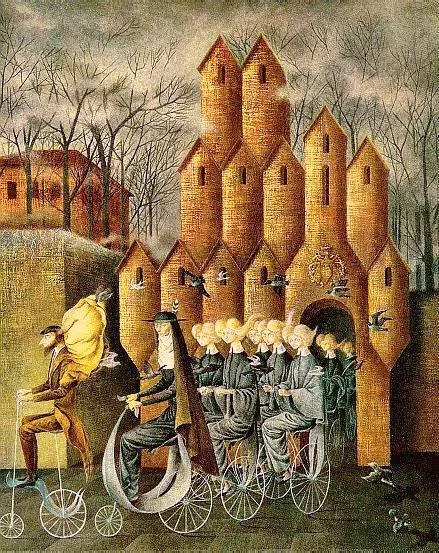Is TikTok the New Surrealism?
[Toward the Tower by Remedios Varo, 1961.]
This winter, I visited the Metropolitan Museum of Art in New York to see the show “Surrealism Beyond Borders.” I was tagging along with noted art and music writer Sasha Frere-Jones, who went on to write a remarkable piece about the exhibition.
I’ve always been attracted to surrealism, an artistic movement that makes everyday objects strange and has maintained, since its advent in the 1920s, the ability to surprise and delight us. Frere-Jones elegantly sums up its core tenet in his piece: “Surrealism,” he writes, “is the unconscious response (Freud) to material pressure (Marx).”
The exhibit has since moved to London’s Tate Modern museum, where it will be on view through August. I called Frere-Jones to discuss what makes Surrealism so provocative a hundred years on. Here are the takeaways.
Life is weird
While it’s hard to define surrealism precisely, it tends to feature everyday objects in strange juxtaposition, rarely dwelling in abstraction. “It has to have some element of realism,” says Frere-Jones. “If you're really, really pressed for time,” he jokes, “just think of dreams and then you're done. You are processing something that exists in the world. You are definitely talking about a thing or a person or a process that is known to you.”
He continues, “The entry drug for everyone when they're young is usually, oh, the clock is melting. Why is the clock melting? And someone would say, well that's because time is permanent, but it's also impermanent, you know? Or there's Magritte’s man, and the man's head is an apple and he's floating. And so that looks like you're going to work in the morning in London and everyone's wearing a bowler, but they're all messed up and not real to you.”
No borders, no cops
Many 20th century artistic movements attracted their share of fascists – the avant-garde experiments of modernism shared space with the Nazi apologias of Ezra Pound; proponents of Italian futurism turned their creative gifts to glorifying dictator Benito Mussolini.
Surrealism seems to have fascist immunity in its DNA.
“Let’s just say that there are no surrealist cops,” writes Frere-Jones, adding, “I feel certain that there are impressionist cops but cannot prove it.” There does seem to have been a bit of impressionist fascism, anyway – Edgar Degas was a noted anti-Semite.
Why, I wondered, did surrealists, as Frere-Jones put it in his article, “generally favor the right side of history,” while other groups of artists were swayed?
Frere-Jones cites surrealism’s origins as a literary genre created by thinkers who were seriously involved with the Communist Party in France. Both the artistic movement and the party became vehicles for transforming World War I’s demented carnage into some sort of understanding and hope.
Many of the movement’s central figures remained engaged with the party and other forms of leftist politics on and off throughout their careers. In addition, surrealism caught on quickly around the world.
“So you've got Haiti, you've got Cuba, you've got … lots of countries and lots of nonwhite, non-European countries,” he says, which gives surrealism deep roots in places where people were battling colonialism. He cites Aimé Césaire’s epic surrealist poem “Notebook of Return to My Native Land,” as “one of the greatest poems ever written, an extremely anti-cop poem that I just love.”
“Surrealism Beyond Borders” features art from all over the world and, to their credit, the curators have endeavored to decenter Paris. Discussing his work, Cuban artist Wifredo Lam said his goal was to “disturb the dreams of the exploiters.”
Old and new
Frere-Jones confesses he wasn’t initially drawn to surrealism. The piece that ultimately pulled him in was a series of paintings by Remedios Varo – a sort of surrealist triptych finished in 1961. “I realized that most church frescoes are surrealism,” Frere-Jones explains. “There is so much in the world that combines the material pressures we face, and that's what Marx is sort of about. And then Freud – unconscious processing of all of that stuff. I thought, OK, this can really be found in many places,” he says.
“I care about surrealism as this strange way of processing life, which I was also seeing all over TikTok. You know, people use words like ‘sh*tposting,’ but that’s not really what it is,” he continues. “There are people making very funny, sophisticated little film and sound edits that mean ‘nothing,’ that are absurdist, but they express a lot.”
Is resistance possible?
Surrealism’s power lies in its ability to disturb and unsettle – to haunt your dreams by drawing from them. I wondered if the formal techniques of surrealism could have much force today, when everything is constantly juxtaposed with everything else and there’s little left that can shock. Lady Gaga’s meat dress, for example, bore all the hallmarks of surrealism, but didn’t, to me, seem all that shocking.
Frere-Jones agreed, noting that “none of this is particularly jarring anymore. If a very fancy celebrity wears a meat dress, you could say that's the persistence and a triumph of surrealism, or you could say, no, everything's been co-opted and recaptured.”
Instead, he cited the sheer amount of video footage people now watch in a single day, and TikTok mashups that are “disquieting and goofy.”
“What is an art form that liberates us now, and feels like it would pair with the work that needs to be done now? I think it would vibe with surrealism, but if it's going to freak people out and make them feel like doing the work, it probably wouldn't be, you know, original recipe surrealism," he says.
We kicked around a few ideas – what if you set up two Siris to answer each other in an infinite loop? – and kept returning to the sense of play that suffuses surrealist work.
Frere-Jones noted that surrealism rose in the wake of the unfathomable violence of World War I. It was not some lighthearted game, but in fact a way to go on after seeing the darkest side of human folly. In an age of intense friends-and-enemies politics, could we gain something by turning again to the uncomfortable gray shadows of the unconscious?




